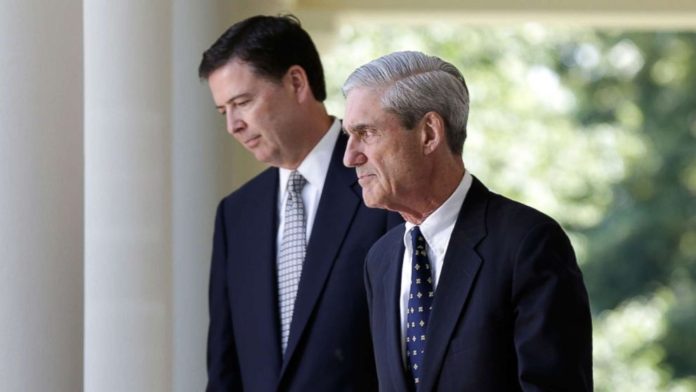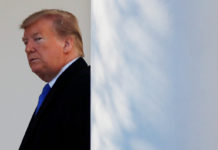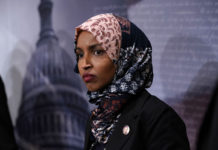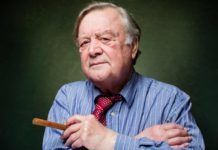The drama surrounding his firing while he was overseeing the Russian interference investigation left James Comey concerned about the motives of President Donald Trump, but one person he has faith in is special counsel Robert Mueller.
“The American people can have complete confidence in Robert Mueller,” Comey said.
“He’s not on anybody’s side. He does not care about anything except the truth,” he said, adding that the American public “can have great confidence if Bob Mueller is left in place to do his job, he will find the truth.”
Comey discussed his decades-long history with Mueller during his exclusive interview with ABC News’ chief anchor George Stephanopoulos ahead of the April 17 release of Comey’s book “A Higher Loyalty: Truth, Lies, and Leadership.”
“He and I are not close friends, but I’ve known him and watched his work,” Comey said of Mueller.
“I think we played golf once in our 25 years. And I’ve had dinner with him maybe once or twice. So I know him and … we’re friendly. But I know his work most of all. And I’ve watched it closely,” Comey said.
Comey’s account of his relationship with Mueller is somewhat less effusive than it had been in years past. Both Comey and Mueller praised one another publicly before, specifically when Comey succeeded him in 2013 as director of the Federal Bureau of Investigation.
Comey said that in taking on the role he would “be standing truly on the shoulders of a giant, someone who has made a remarkable difference in the life of this country.” And Mueller, in turn, called Comey “a man of honest, dedication and integrity.”
Trump picked up on their relationship and took it on as a point of concern after Mueller was appointed as special counsel, telling Fox News in June 2017 that Mueller is “very, very good friends with Comey, which is very bothersome.”
A telling moment
One instance where Comey saw Mueller at work came at a pivotal moment during which he believed the integrity of the Justice Department was at stake.
In 2004, Comey was the acting-Attorney General because then-Attorney General John Ashcroft was gravely ill. Comey told then-President George W. Bush’s team that the Department of Justice had found that their authorization of certain surveillance programs was not legally justified and it would not be recertified.
In spite of Comey telling then-Vice President Dick Cheney of that decision, two top White House officials tried to pressure Ashcroft to reauthorize the surveillance program when he was in intensive care in a Washington, D.C., hospital. Comey told Stephanopoulos that Ashcroft summoned the power to turn the White House officials down when they arrived at his bedside.
Mueller was the FBI director at the time, and the agency was “a key participant in the program,” Comey recalled, summarizing Mueller’s view as “if the Justice Department can’t find a lawful basis for this, there’s no way the FBI is participating.”
“So I called Bob and told him what was happening” at the hospital, Comey told Stephanopoulos. “And I wanted him to know about it because of his stature and his ability. He and I weren’t close, we weren’t friends in any social sense. But I knew he saw it the way I did. And I knew that his gravitas, his experience, his weight, would be important. And he said, ‘I’ll be right there.’”
Mueller arrived at the hospital after the White House officials had left.
“He came in moments later and he stood and leaned down and spoke to the desperately ill attorney general and told him that, in every man’s life, there comes a time when the good Lord tests him. And then he said, ‘You’ve passed your test tonight,’” Comey recounted.
“I was overcome with emotion hearing that. And had this sense that the law held. The law held. It felt like a dream to me, that we were in a hospital room with senior officials trying to get the desperately ill attorney general to sign something. But it wasn’t a dream….










